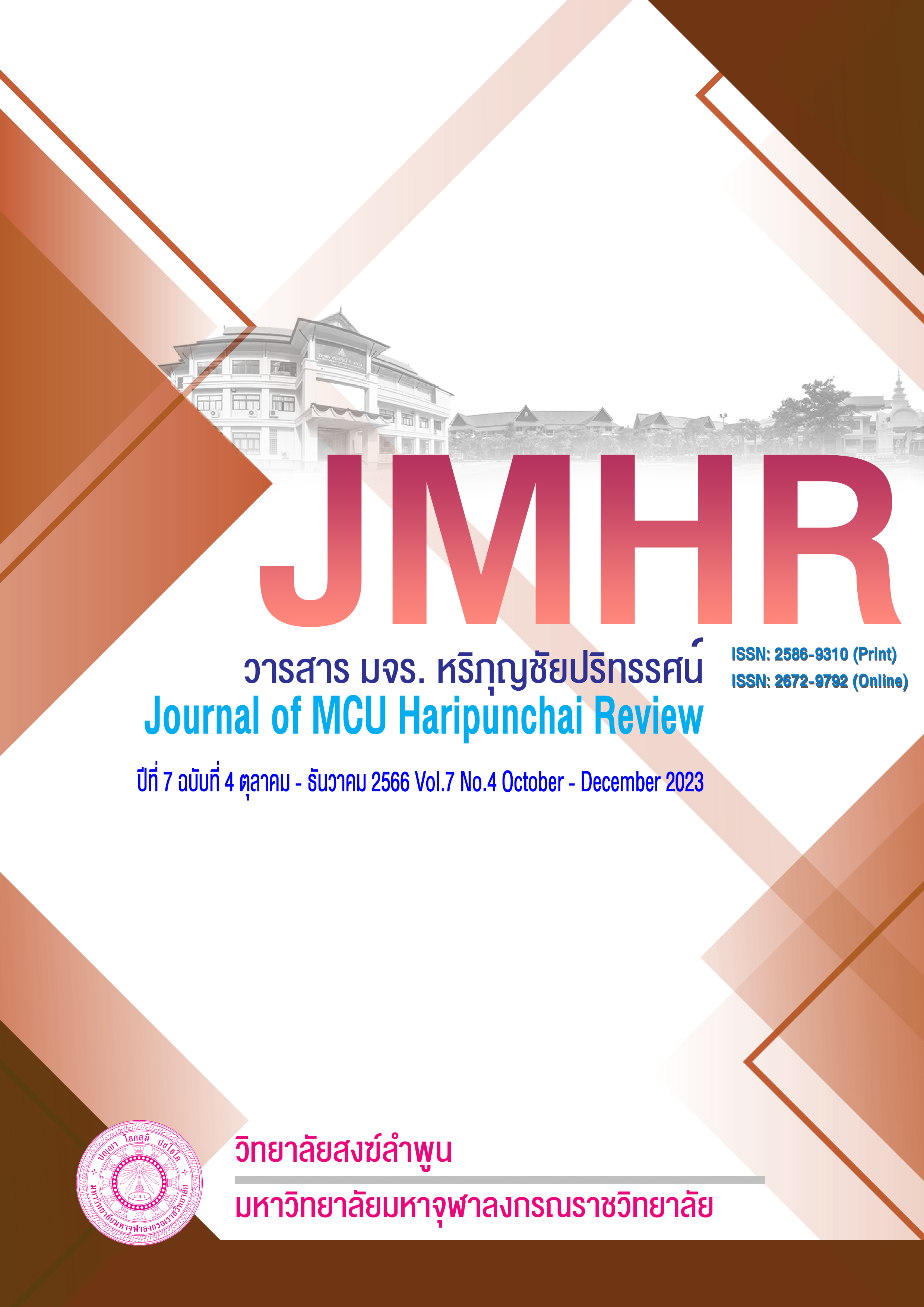Development of Educational Administration Model Applying the POSDC Concept for Phrapariyattidhamma Schools General Education Department Lamphun Province
Main Article Content
Abstract
This research study aims to 1) to study the educational administration according to the Buddhist way of Phra Pariyatidhamma School Department of General Education in Lamphun Province 2) develop the school administration model according to the POSDC concept, 3) experiment with the educational school administration model according to the POSDC concept, and 4) examine the efficiency of the school administration model according to the POSDC concept for Buddhist monks' groups. Department of General Education, Lamphun Province. The population and the sample consisted of 59 teachers and educational personnel or figures. The research tools were questionnaires, focus groups. and check form Data were analyzed by statistics, frequency, mean, and standard deviation. and content analysis
The research results showed that:
1) The condition of school administration according to the concept of POSDC in five aspects was at a very good level.
2) Evaluation results and development of school administration model according to POSDC concept for Phrapariyattidhamma schools group Department of General Education Lamphun province before and after the experiment using Paired T Test statistics for general administration. There are improvements in all assessment results. When considering each item, it was found that the item with the highest average development was that the executive had a good personality, warm, and easily adaptable to others.
3) The results of using the educational management model according to the concept of POSDC before and after the experiment using Paired T Test statistics in all 4 aspects, it was found that the statistical values were significantly different at .05.
4) Examination of the model prepared by experts found that the model is appropriate and feasible. and have consistent opinions
Article Details

This work is licensed under a Creative Commons Attribution-NonCommercial-NoDerivatives 4.0 International License.
References
กองพุทธศาสนศึกษา. (2553). แผนยุทธศาสตร์และแผนปฏิบัติการพัฒนาการศึกษาโรงเรียนพระปริยัติธรรม แผนกสามัญศึกษา พ.ศ. 2553-2562. กรุงเทพมหานคร: สำนักงานพระพุทธศาสนาแห่งชาติ.
กิจจานุเบกษา. (2562). พระราชบัญญัติการศึกษาพระปริยัติธรรม พ.ศ. 2562. เล่มที่ 136. ตอนที่ 50 ก. วันที่ 16 เมษายน 2562.
พระมหาอาคม อานันโท (อาคม). (2556). หลักธรรมของผู้บริหารในพระพุทธศาสนาการบริหารโรงเรียนพระปริยัติธรรมจังหวัดนครสวรรค์. พุทธศาสตรมหหาบัณฑิต. บัณฑิตวิทยาลัย. มหาวิทยาลัยมหาจุฬาลงกรณราชวิทยาลัย
พระมหาศรีอรุณ คาโท.(2559). พุทธวิธีทางการบริหารสำหรับองค์กรภาครัฐสมัยใหม่. วารสารวิจัยเพื่อพัฒนาสังคมและชุมชน มหาวิทยาลัยราชภัฏมหาสารคาม. 3 (3). (สิงหาคม–ธันวาคม) : 1-10.
พระครูสังฆรักษ์ศุภณัฐ ภูริวฑฒโน. (2562). พุทธวิธีการบริหารเวลาอย่างมีประสิทธิภาพ. วารสารธรรมวิชญ์. 2 (2), (กรกฎาคม – ธันวาคม) : 325-337.
พระธรรมโกศาจารย์(ประยูร ธมฺมจิตฺโต). (2549). พุทธวิธีบริหาร. กรุงเทพมหานคร : โรงพิมพ์ มหาจุฬาลงกรณ์ราชวิทยาลัย.
พระครูวุฒิธรรมานันท์.2554). การบริหารโรงเรียนพระปริยัติธรรม เขตบางกอกนอย กรุงเทพมหานคร. วิทยานิพนธ์ศึกษาศาสตรมหาบัณฑิต. บัณฑิตวิทยาลัย มหาวิทยาลัยมหาจุฬาลงกรณราชวิทยาลัย.
มลวิภา สิขเรศ. (2559). การบริหารสถานศึกษาเชิงพุทธบูรณาการของผู้บริหารสถานศึกษา. วารสารครุศาสตร์ปริทรรศน์. 3 (1), (มกราคม-เมษายน) : 113-126.
แสงอาทิตย์ ไทยมิตร.(2558). พุทธวิธีการบริหารกับจริยธรรมภาวะผู้นำเชิงพุทธในสถานศึกษา. วารสาร “ศึกษาศาสตร์ มมร” คณะศึกษาศาสตร์ มหาวิทยาลัยมหามกุฏราชวิทยาลัย. 3 (2), (กรกฎาคม – ธันวาคม) : 13-24.
อนุชิต วรรณสูตร. (2548). การศึกษาคุณลักษณะผู้บริหารสถานศึกษามืออาชีพในอนาคต. รายงานการวิจัย. บัณฑิตวิทยาลัย: สถาบันราชภัฏบุรีรัมย์.
Faul, F., Erdfelder, E., Buchner, A. & Lang, A. G., (2009). G*Power 3.1:Tests for correlation and regression analysis. Behavior Research Methods. 41 (4): 1149-1160.


